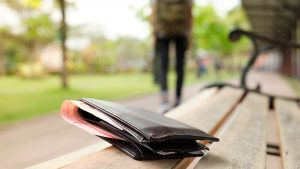Losing your wallet

It’s funny how times change. Back in the days before cell phones, the loss of a wallet – a physical wallet – was a significant disaster. What other piece of property contained so much information about yourself? Credit cards, driver’s license, photographs, etc. It would take some serious legwork to regain these important pieces of information once they were lost, and there was certainly a risk of them being used against you.
I suppose the loss of a wallet is still a tough pill to swallow, but in large part we run much greater risks now in the possible loss of our smart phones. Leaving it unlocked on the metro seat could open up untold treasures to an unscrupulous thief who could access email, Facebook, account passwords, bank account numbers, and…well, the list is extensive.
Unlike with a wallet, though, a smart phone can at least be locked (you do have a passcode of some sort on your phone, right?) and can even be wiped remotely. That’s the good. The bad, however, is that unless you’re careful, a thief doesn’t need to have physical access to your phone to come away with your information. Hacks, malware, and phishing can do the job for them from the comfort of their own living room.
So once you’ve taken care of the physical security of your phone (passcodes, “find my phone,” etc.), here are some things to do to protect if from the long-distance kind of theft.
- Updates: Just like your computer, your smart phone’s operating system and your apps regularly receive updates, some of which are patching security holes before the crooks can utilize them. When an update comes along, take advantage of it.
- Apps: We all love apps, but if we’re not careful, they can be the security weakness that we didn’t see coming. First, only download apps from trusted sources like the App Store, Google Play, etc. Other sites may seem safe and have great deals, but their vetting process for the apps they sell are usually not nearly as stringent and lots of fake and/or altered programs are there for the accidental taking. Once on your phone, these malicious apps can do all sorts of damage, from serving annoying ads to stealing your information.
- More About the Apps: Even with safe, legitimate apps, you should periodically check your permissions to see what apps are requesting what information from your phone. Only allow an app access to the parts of your phone necessary for it to perform its job. Does that day-planner really need access to your camera? Does that game really need access to your microphone? Also, if you’ve stopped using an app, revoke its permissions or, even better, delete it from your phone entirely.
- WiFi: Treat your phone just like you would your laptop, which means don’t connect to public WiFi. These insecure connections can be accessed by anyone and used as a means of hacking into your phone. Use your cell connection whenever possible and get a VPN (like the one offered by PSMail) if you must use public networks.
- Unknown Links and Unknown Senders: As always, never click on an unexpected or suspicious link. On your phone this includes SPAM text messages which can download malware onto your phone the moment your click the link.
- Consider Antivirus Software: As with your laptop or computer, consider using antivirus software on your phone as another layer of protection against spyware and malware.
These precautions will go a long way towards securing your phone even while it’s still in your pocket. As for accidentally leaving your wallet on the bus? I’m afraid that’s still up to you.
